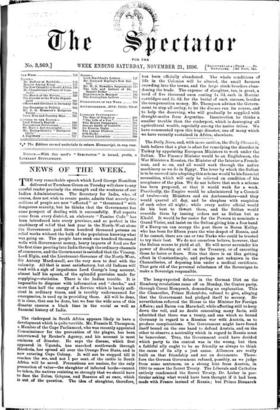The rinderpest in South Africa appears likely to have a
development which is quite terrible. Mr. Francis R. Thompson, a Member of the Cape Parliament, who was recently appointed Commissioner for the prevention of the plague, has been interviewed by Reuter's Agency, and his account is moat Ominous of disaster. He says the disease, which first appeared in Uganda, has marched southwards through Rhodesia, has spread all over the Orange Free State, and is now entering Cape Colony. It will not be stopped till it reaches the sea, and not 1 per cent. of the cattle in South Africa will be saved. Precautions are useless, for the only precaution of value—the slaughter of infected herds—cannot be taken, the natives resisting so strongly that we should have to face the Zulus, Griquas, and Basutos all at once, which is out of the question. The ides of slaughter, therefore,
has been officially abandoned. The whole conditions of life in the Colonies will be altered, the small farmers crowding into the towns, and the large stock-breeders aban- doning the trade. The expense of slaughter, too, is great, a herd of five thousand oxen costing ls. 33. each in Martini cartridges and 2s. Gd. for the burial of each carcass, besides the compensation money. Mr. Thompson advises the Govern- ment to stop all outlay, to let the disease run its course, and to help the deserving, who will gradually be supplied with draught-mules from Argentina. Insurrection he thinks a smaller trouble than the rinderpest, which is destroying all agricultural wealth, especially among the native tribes. We have commented upon this huge disaster, one of many which we have recently sustained in Africa, elsewhere.






















































 Previous page
Previous page